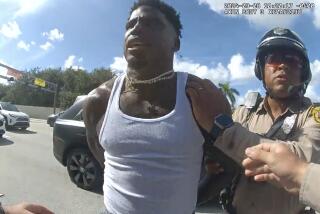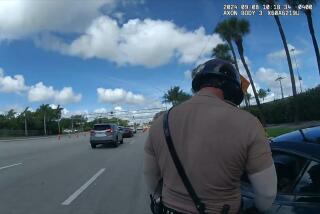Hill Returns to Teaching, Says She Does Not Regret Testimony : Aftermath: She said bringing the allegation ‘was the right thing to do.’ Friends say the law professor is determined to resume her schedule.
- Share via
NORMAN, Okla. — Anita Faye Hill returned to her law classroom at the University of Oklahoma on Tuesday, apparently beginning a determined effort to resume her life in the wake of nine days in the intense glare of public scrutiny.
After Supreme Court nominee Clarence Thomas was confirmed by the Senate early Tuesday evening, Hill briefly met with reporters outside her home. She declined to comment on the confirmation, but said she was pleased that “the issue of sexual harassment is now part of a dialogue. I cannot tell you how many letters and cards I have received from people throughout the country who are concerned about this . . . I hope that none of this will deter others from coming forward.”
Hill, whose allegations of sexual harassment by Thomas resulted in three days of tumultuous hearings before the Senate Judiciary Committee, said she did not regret her testimony.
“My gut reaction is that it was the right thing to do,” she said. “Even looking at how hard it was, I would do it again because it was the right thing. I’m not sure I could live with myself if I had answered those questions, the Senate staff questions, any differently. I couldn’t sleep probably as well as I can sleep tonight.”
She quickly excused herself--”I thank you all for this opportunity to talk, and I wish you all a good evening”--saying she had no plans for additional news conferences or interviews.
Earlier in the day, Hill, 35, flanked by a plainclothes policeman, mounted the steps of the law school, passing through a line of television cameramen who stood on the top step.
As was the case Monday, when she returned to Norman from Washington, Hill declined to answer questions. Instead she first visited the dean of the law school, David Swank, then went on to Classroom 5 to teach her contracts class.
Todd Hicks, one of the students in Hill’s first class, told the Associated Press that the professor made a brief introduction and got right to the lesson.
“She said, ‘I don’t think they’ll ever leave me alone,’ then told us she missed us,” Hicks said.
“She was not herself, that was obvious. It was like she hadn’t prepared as much, like she’d been away for a while.”
Shirley Wiegand, a close friend of Hill’s and also a law professor, said that from now on, “I think (Hill) will stick to her normal schedule because she has decided to do it,” said “She has an incredible strength of character. If she decides she is going back to the normal life, she will as much as possible.”
While Hill made the effort to return to her heretofore very private life, the question of whether she could do so, and whether she should do so, remained in doubt.
Jay Smith, the president of the University Faculty Senate, expressed concern that Hill might attempt to step completely out of the public arena, thereby causing women who have been victims of sexual harassment to fear that retreat is their fate.
“I frankly hope she is not driven so much from the spotlight that she will not participate,” Smith said in an interview Tuesday. “I fear women would see what has been done to her and not come forward with the things that have happened to them. I’m not so fearful that she will try to make loads of money, but that she will retreat. I would hope she would not do that.”
In her brief conversation with reporters Tuesday night, Hill was asked if she was afraid of becoming a symbol of something.
“Well, I’m not afraid of anything right now, I just have no ambition to become a symbol,” she said. “I think there are so many women out here who have experienced the same thing I experienced, that we don’t need symbols. This is a real issue, this isn’t a symbolic issue. It’s an important thing, and I just want us to keep that in mind, don’t lose sight of that.”
Smith said that he had heard the word “courage” in many conversations with other faculty members about Hill and that she could bank on encouragement and support on the campus.
As an example of that, he described how he worried about an unscheduled resolution before the faculty senate Monday condemning sexual harassment and praising Hill.
It could have been postponed by a single vote of the 53-member body, but “it was passed unanimously,” Smith said. “The resolution was criticized because it wasn’t strong enough. I think it represents the way the majority of the faculty feel about Anita.”
Dewey Selmon, a former Oklahoma and professional football star--as well as Hill’s neighbor--said at least in the short term Hill’s life would be impacted, but that it had been worth it because “in two days she did a lot for the females in the American workplace.”
But he also said he did not think Hill could be a standard-bearer for women because it was not in her character. “Anita cannot be the emblem that has to be up front all the time,” he said. “But she opened the door for all women to stand up.”
Norman Mayor Dick Reynolds said he did not think people of his city would think Hill acted wrongly by testifying for the Senate.
“I would say Norman would not be a judgmental town about her activities,” he said. “Some agree. Some don’t. I don’t think Norman would light in and ostracize her.”
However, one longtime Norman resident--who herself went through difficult times in this university town many years ago--said there could still be some difficult days ahead for Hill after the camera lights have been turned off.
“I don’t think anyone is going to go by her house and throw rocks at her,” said Barbara Henderson, who, along with her husband, became the first black family to own a house in Norman in 1967. “But this is not finished. Whatever the outcome, I think Anita has been harmed. I think there will be some erosion into her credibility, it’s hard to imagine now that would not happen.”
Henderson, whose husband is a well respected University of Oklahoma faculty member, said when they moved into their home in 1967, there were threats against them, garbage was thrown in the lawn and for several years her family was “in a fishbowl.” She said she thought the same thing could happen to Hill, though the world had changed sufficiently to make how she is treated more subtle.
Henderson said that as she was watching Hill at the hearings, she said to herself--and metaphorically to Hill--”Run like hell. Get out of there. You’re only going to get hurt.
“She’ll stay but it will never be the same,” she said, predicting the letdown would come later rather than sooner.
“It’s like after everyone has gone home from the funeral and you’re there by yourself. It feels like a death. There is hurt. There is pain.”
More to Read
Sign up for Essential California
The most important California stories and recommendations in your inbox every morning.
You may occasionally receive promotional content from the Los Angeles Times.













